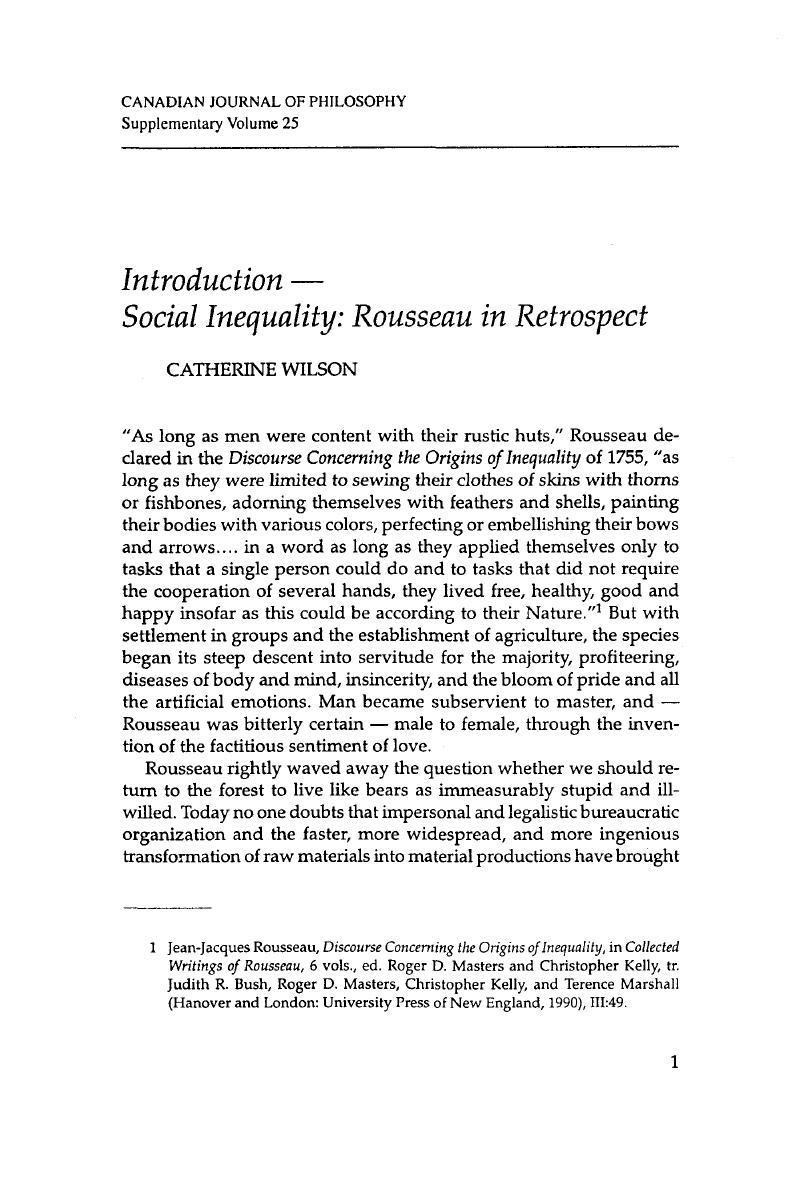Published online by Cambridge University Press: 01 January 2020

1 Jean-Jacques Rousseau, Discourse Concerning the Origins of Inequality, in Collected Writings of Rousseau, 6 vols., ed. Roger D. Masters and Christopher Kelly, tr. Judith R. Bush, Roger D. Masters, Christopher Kelly, and Terence Marshall (Hanover and London: University Press of New England, 1990), 111:49.
2 Gerard Winstanley, quoted in Christopher Hill, The World Turned Upside Down: Radical Ideas during the English Revolution (Aylesbury: Penguin, 1972), 132-33.
3 John Woolman, The Works of John Woolman, 1774. The reference is to p. 54 of a contemporary edition, The journals and Major Essays of John Woolman, ed. Philip S. Moulton (Richmond, IN: Friends United Press, 1971).
4 Rousseau, The Social Contract, in Collected Writings, IV:413.
5 Rousseau, ‘Geneva Manuscript,’ in Collected Writings, IV: 77.
6 Joseph A. Schumpeter, Imperialism and Social Classes (New York: Augustus M. Kelley, 1951).
7 Martha Nussbaum, for example, has demonstrated how philosophical and economic perspectives can be concurrently employed in her studies of well-being. See the collection of essays edited by Amartya Sen and Martha Nussbaum, The Quality of Life (London: Oxford University Press, 1993), and James Griffin, Well-Being: Its Meaning, Measurement and Importance (Oxford: Clarendon, 1986).
8 See Solly Zuckerman, The Social Life of Monkey and Apes, 2nd ed. (London: Kegan Paul, Trench and Trubner, 1981), and Sarah Hrdy, The Woman that Never Evolved (Cambridge, MA: Harvard University Press, 1981).
9 Rousseau, Discourse on Inequality, in Collected Writings, III: 54.
10 Rousseau, Discourse on Inequality, in Collected Writings, III: 54.
11 J.J. Rousseau, Émile ou de I'éducation (Paris: Gamier, 1961). See the summary of his views on women in Lester G. Crocker, Jean-Jacques Rousseau: The Prophetic Voice (New York: Macmillan, 1973), 156ff.
12 Elise Boulding, ‘Nomadism, Mobility and the Status of Women,’ Ch. 2 of Women in the Twentieth Century World (New York and London: Sage Publications, 1977), 33-54.
13 Friedrich Engels, The Origins of the Family, Private Property and the State, 1884. The first English translations appeared in 1907; the modern edition (New York: Pathfinder, 1972) contains a useful introduction describing Engels's anthropological sources by Evelyn Reed.
14 Michel Foucault, Discipline and Punish, trans. A. Sheridan (Harmonsworth: Penguin, 1991) and The History of Sexuality, 2 vols., trans. R. Hurley (Harmondsworth: Penguin, 1988).
15 The following deserve mention: David Riesmann, The Lonely Crowd (New Haven: Yale University Press, 1950); Jules Henry, Culture Against Man (New York: Random House, 1963) and Pathways to Madness (New York: Random House, 1971); Edgar Z. Friedenberg, The Vanishing Adolescent (Boston: Beacon, 1959); Deference to Authority: The Case of Canada (White Plains, NY: M.E. Sharpe, 1980).
16 Titles ranged from The Hidden Persuaders (1957), The Status-Seekers (1959), The Waste-Makers (1960), The Pyramid-Climbers (1962), and The Sexual Wilderness (1968) to The People-Shapers (1977) and The Ultra Rich (1989).
17 Bernard Williams, ‘Moral Luck,’ in Moral Luck (Cambridge: Cambridge University Press, 1983).
18 E.O. Wilson, On Human Nature (Cambridge, MA: Harvard University Press, 1978), 147.
19 Nancy Cartwright, How the Laws of Physics Lie (New York: Oxford University Press, 1983); John Dupre, The Disorder of Things (Cambridge, MA: Harvard University Press, 1993).
20 Claude Lévi-Strauss, ‘Introduction’ to André Burguière, Christine Klapisch-Zuber, Martine Sengalen, and Francoise Zonabend, A History of the Family, 2 vols., trans. Sarah Hansbury Tenison, Rosemary Morris, and Andrew Wilson (London: Polity, 1996), 1-7.
21 Tracy Johnson, ‘Quit Watching Me!’ Globe and Mail Report on Business Magazine (February 1999), 58.
22 Thomas Malthus, An Essay on the Principle of Population, 1798, quoted in Kenneth Lux, Adam Smith's Mistake (Boston: Shambhala, 1990), 35.
23 Thomas Nagel, Equality and Impartiality (New York: Oxford University Press, 1991), 102-03.
24 Jürgen Habermas, The Theory of Communicative Action, 2 vols., trans. Thomas McCarthy (Boston: Beacon, 1984,1989), I: 285ff.
25 Jürgen Habermas, ‘Arnold Gehlen: Imitation Substantiality,’ in Philosophical-Political Profiles, trans. Frederick G. Lawrence (Cambridge, MA: MIT Press, 1990), 123.
26 David Hume, Inquiry Concerning the Principles of Morals, ed. Tom L. Beauchamp (Oxford: Clarendon, 1978), 67.
27 Harry Bracken, ‘Philosophy and Racism,’ Philosophia 8 (1978): 241.
28 A careful analysis is to be found in Elizabeth V. Spelman, ‘Aristotle and the Politicization of the Soul,’ in Social and Political Philosophy, ed. James Sterba (Belmont, CA: Wadsworth, 1995), 63-71.
29 Sabina Lovibond, ‘An Ancient Theory of Gender: Plato and the Pythagorean Table,’ in Women in Ancient Societies: An Illusion of Night, ed. Leonie Archer, Susan Fischler, and Maria Wyke (Basingstoke and London: MacMillan, 1994), 88-101. See also Julia Annas, ‘Plato's Republic and Feminism,’ Philosophy 51 (1976): 307- 21.
30 John Locke, A Letter Concerning Toleration, ed. John Horton and Susan Mendus (London and New York: Routledge, 1991), 17.
31 Locke, ‘On the Reform of the Poor Laws,’ in The Enlightenment: A Comprehensive Anthology, ed. Peter Gay (New York: Simon and Schuster, 1973), 99-107.
32 See on this subject the classic article by Susan Mendus, ‘Kant: An Honest but Narrow-Minded Bourgeois?’ in Women in Western Political Philosophy, ed. Ellen Kennedy and Susan Mendus (New York: St. Martin's Press, 1987), 21-43.
33 John Woolman, The Journals, 118.
34 Mary Wollstonecraft, A Vindication of the Rights of Woman (1792, reprint New York: Morton, 1988).
35 Lea Campos Boralevi, ‘Utilitarianism and Feminism,’ in Women in Western Political Philosophy, ed. Kennedy and Mendus, 159-78; Bentham and the Oppressed (Berlin and New York: Publications of the European University Institute, 1984). See also Susan Muller Okin's chapter 4 in Women in Western Political Thought (Princeton: Princeton University Press, 1979).
36 Bhikhu Parekh, ‘Decolonizing Liberalism,’ in The End of'Isms'?, ed. Alexander Stromas (Oxford: Blackwell, 1994), 85-103.
37 Jeffrey Masson, The Assault on Truth: Freud's Suppression of the Seduction Theory (New York: Farrar, Straus, and Giroux, 1984).
38 The woodcut, identified as after Jacques Le Moyne de Morgues, is described by Olive Dickason in The Myth of the Savage (Edmonton: University of Alberta Press, 1984), 49. Reproduced by permission of the Public Archives of Canada.